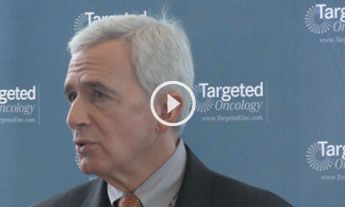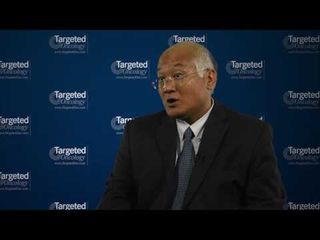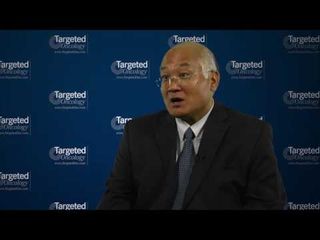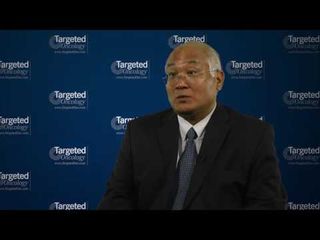
GI CANCERS
Latest News
Latest Videos

More News

Manuel Hidalgo, MD, shares his insight on the growth of genetic testing in CRC.<br />

Manish A. Shah, MD, director of gastrointestinal oncology, Weill Cornell Medicine and New York-Presbyterian Hospital, discusses the decreasing incidence of colon cancer diagnosis in those over the age of 50.

In patients with heavily-pretreated microsatellite stable metastatic colorectal cancer (mCRC), treatment with CEA-TCB, an investigational CEA/CD3 bispecific antibody, showed a favorable safety profile and promising efficacy, with enhanced efficacy when combined with the PD-L1 inhibitor atezolizumab.

Dominik P. Modest, MD, discusses a retrospective, central evaluation of the FIRE-3 study to determine surgical treatment options, which explored the number of patients with metastatic colorectal cancer who had resectable disease during systemic first-line therapy.
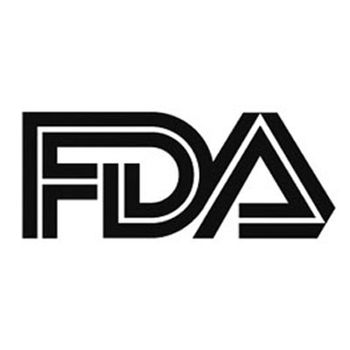
Nivolumab (Opdivo) has been granted an accelerated approval by the FDA for the treatment of adult and pediatric patients with microsatellite instability-high or mismatch repair deficient metastatic colorectal cancer that has progressed following treatment with a fluoropyrimidine, oxaliplatin, and irinotecan.

Diane M. Simeone, MD, is stepping up to lead the new Pancreatic Cancer Center at NYU Langone. She has been a member of NYU Langone since March 2017, and will continue in her role as associate director of translational research at the Perlmutter Cancer Center.




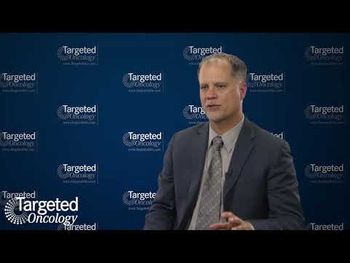


Recurrent Metastatic Gastrointestinal Stromal Tumor

Lutathera (lutetium [<sup>177</sup>Lu] oxodotreotide) has been recommended for approval by the European Medicines Agency’s Committee for Medicinal Products for Human Use (CHMP) for the treatment of patients with unresectable or metastatic, progressive, well-differentiated (grade 1 and grade 2), somatostatin receptor positive gastroenteropancreatic neuroendocrine tumors (GEP-NETs).

Tanios Bekaii-Saab, MD, discusses the the promise of napabucasin in pancreatic cancer.

In a 17-0 vote, the FDA’s Oncologic Drugs Advisory Committee unanimously recommended the approval of ABP-215, a biosimilar for bevacizumab.

Weijing Sun, MD, has been appointed the new Sprint Foundation Professor of Medical Oncology and the director of the Division of Medical Oncology at The University of Kansas School of Medicine and The University of Kansas Cancer Center.

David J. Pinato, MD, PhD, NIHR Academic Clinical Lecturer in Medical Oncology, resident, Royal Brompton Hospital and Imperial College London, discusses an analysis of intra-tumor heterogeneity in the regulation of immune-tolerogenic pathways in primary and metastatic hepatocellular carcinoma (HCC).

Ann-Lii Cheng, MD, discusses a phase III trial of lenvatinib vs sorafenib in the first-line treatment of patients with unresectable hepatocellular carcinoma.

Luis A. Diaz Jr, MD, head, Division of Solid Tumor Oncology, Memorial Sloan Kettering Cancer Center, discusses the recent FDA approval of pembrolizumab (Keytruda) for microsatellite instability-high (MSI-H) colorectal cancer and other tumor types.

A large analysis of data comparing selective internal radiotherapy (SIRT) plus chemotherapy to chemotherapy did not show expected improvements in survival, but an unanticipated benefit was observed with SIRT in patients with metastatic colorectal cancer.

Overall survival was prolonged with treatment with ziv-aflibercept compared to placebo across subgroups of patients with metastatic colorectal cancer with wild-type and mutated <em>RAS, KRAS,</em> and <em>BRAF</em> genes.

Panitumumab has been approved by the FDA in combination with FOLFOX as a frontline treatment for patients with <em>RAS</em> wild-type metastatic colorectal cancer.

Treatment with lenvatinib in the first-line setting of unresectable hepatocellular carcinoma improved progression-free survival by 3.7 months and was noninferior for overall survival (OS) compared with sorafenib.

Yelena Y. Janjigian, MD, attending physician, Memorial Sloan Kettering Cancer Center, discusses findings of CheckMate-032, a study of nivolumab (Opdivo) with or without ipilimumab (Yervoy) in patients with advanced/metastatic chemotherapy-refractory gastric, esophageal, or gastroesophageal junction cancer.




